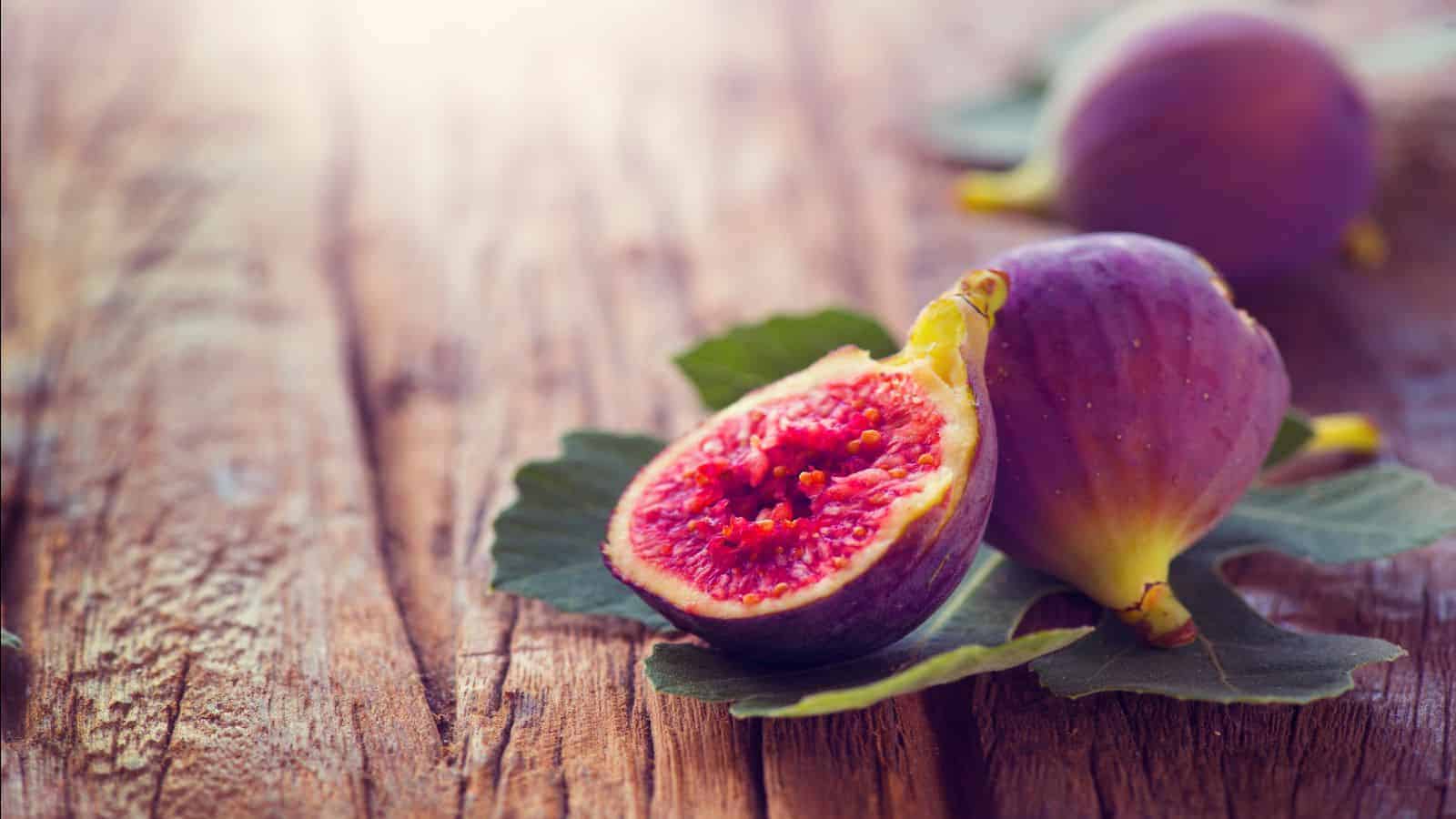Historians often cite the Middle East as the home of civilization. Some of these culture’s earliest records describe the grains, vegetables, and fruit they learned to cultivate from native wild species, such as fig trees. Modern science is discovering the many benefits of adding figs to your diet.
Figs: Ambrosia of the Gods
For thousands of years, Eastern cultures recognized figs as a delicacy fit for divinity, royalty, and laborers alike. As trade and discovery spread from the Eastern to the Western hemisphere, fig-trees were among the many plants shared.
Sacred texts, art, and literature from around the world adore this tender fruit. In Christian tradition, the first humans sewed together fig leaves to make aprons to hide their nakedness. To those of the Muslim faith, these sweet orbs were considered a divine blessing, along with olives and grapes.
In Ancient Egypt’s afterworld traditions, the souls of royalty were said to be enclosed in one of these fruits after death. Early myths associated certain species with natural spirits, both good and evil. For some cultures, they were both feared and worshiped.
They have been a respectful representation of history and culture, which continues today. If you can’t find figs seasonally, you can usually find them dried or canned as a paste. While they tend to be a bit pricey, they are worth it.

Dietitians share fifteen foods high in soluble fiber to relieve constipation. Hint: the list includes figs!
Fruit or Flower?
When you mention these teardrop fruits, many people immediately associate them with an eponymous stuffed cookie. If you enjoy these yummy pastries, you will adore figs in their fresh form. The tender, meaty insides provide a delicate sweetness that can complement savory or sweet dishes.
The common fig, also known as Ficus, is a relative of the mulberry tree, with at least 840 known varieties. Although we usually consider them fruit in culinary traditions, they are botanically an inverted flower. Ficus bulbs encase their blooms, which nourishes them to ripeness.
The complex sweetness and delicate aroma of Ficus have often been compared to honey. Their tiny seeds are edible and lend a bit of texture to them. In Mediterranean cuisines, Ficus is classically paired with cheeses, nuts, and wine, or cooked with bold meat dishes.
The pureed form is often used to make delicious cookies and cakes in many global cuisines. It’s often turned into lovely jellies, jams, and syrups. Some people around the world use Ficus syrup to flavor coffee, tea, and pastries.
8 Amazing Benefits of Consuming Figs Regularly
Did you know that including delicious figs to your diet and fitness regimen may benefit your health? They have natural sugars and a lovely taste that can be savored in moderation, since eating too many can act as a laxative. You can enjoy them fresh or as dried fruit like dates and plums.
Medical research has not only focused on the whole fruit but has also studied the effects of Ficus leaf extraction. This essential oil can be ingested as a supplement or used topically. Either form of the fruit suggests possible benefits for several health conditions.
Before you incorporate Ficus or leaf extract into your diet, discuss it with your professional healthcare provider. Their natural sugars or enzymes may counteract certain medications or be a risk for some disorders. Here are eight ways that enjoying figs may benefit your wellbeing.
1. Nourish Your Skin
Do you have a dry, irritated complexion? Instead of relying on chemical-based salves and lotions, Ficus may do the trick. Dermatological studies have demonstrated that Ficus-infused lotion can soothe the burning and itching of dermatitis as well as common prescriptions.
Eating these luscious fruits from the Ficus tree may also keep your skin feeling fresh and younger. Scientific research into Ficus enzymes found that they are powerful antioxidants that can destroy cell-damaging free radicals. Don’t be surprised if you discover that your skin is glowing, and fine lines and wrinkles are less noticeable.
2. Benefit Your Cardiovascular System
Cardiovascular disease is one of the top killers in our country. Your professional healthcare provider has probably discussed the importance of good nutrition and exercise for heart health. Perhaps you are learning to avoid fat-laden processed foods for fresh whole foods, like figs.
This tasty fresh or dried fruit has shown promising results in lowering LDL levels, which is the bad cholesterol. Lowering your LHD means less plaque buildup in your vascular system, which can cause heart attacks and strokes. If you are on a statin medication for high cholesterol, never change or stop your doses without your healthcare provider’s advice, but nature can help.
Are you being treated for high blood pressure or hypertension? Ficus may also help lower your blood pressure, which reduces your cardiovascular disease risks. Monitor your blood pressure regularly as your healthcare provider recommends.
3. X Your Blood Glucose Levels
While some adults may develop Type 1 diabetes, the second type is most common. Unlike Type 1, Type 2 diabetes may be preventable and more manageable with proper lifestyle changes. One food that you might consider adding to the menu is fruit from the Ficus tree.
Fruits and some other foods have natural sugars that can cause your blood glucose levels to spike and suddenly drop. It can make you feel tired, irritable, and hungry and can be dangerous in the long run. Nutritionists recommend that you eat whole foods with a low glycemic index, such as Ficus fruits.
4. May Promote Healthy Digestion
With the poor food choices in the average American diet, it’s no wonder so many people battle gastrointestinal health issues. Feasting on overly processed products that are loaded with chemicals and artificial ingredients can wreak havoc on your gut, resulting in serious consequences.
Ficus is a nutritious food that is bountiful in probiotics, vitamins, minerals, and fiber. Along with promoting healthy gut nutrition, the extra fiber helps move waste through your system more efficiently. The probiotics encourage the growth of beneficial flora in your digestive tract.
5. May Lower Your Risks of Certain Cancers
As of now, no miracle food or supplement has been discovered that can prevent or cure cancer. However, countless studies show positive correlations between certain foods and possible anti-cancer benefits. One of these foods is delicious Ficus.
Some science focused on eating the fruit while others studied the positive effects of its leaf extraction. Many researchers are encouraged by how Ficus leaf extraction has shrunk or destroyed tumor cells in test tubes. Testing is still in its infancy, and more research is needed.
6. May Promote Bone Health
Our bodies depend on our skeleton for protection and support. What you eat and your physical activity can either benefit or be detrimental to your bones. While it’s normal for your bones to get weaker as you age, a healthy lifestyle may keep them strong long into your golden years.
For optimal bone health, bone, and joint specialists recommend that you enjoy foods rich in calcium, Vitamin D, Vitamin K, and magnesium. Did you know that Ficus fruit is chock full of these bone-healthy nutrients? Eating them in moderation can be a delicious way to prevent osteoporosis and brittle bone disease.
7. Bring on the Vitamin A
For years, people have munched on healthy carrots because experts touted the veggie’s high content of Vitamin A, which is good for your eyes. You may be pleasantly pleased to find that Ficus are also an excellent source of this vital nutrient.
Not only is Vitamin A beneficial to your vision, but it also boosts your immunity system in the process of building new blood cells. Each system in your body needs Vitamin A for optimal health and function. It benefits all your internal organs.
8. May Promote Your Reproductive Health
Maybe it’s not a coincidence that many ancient cultures considered the Ficus as an aphrodisiac. Before nutrients like magnesium, potassium, zinc, and iron were discovered, they intuitively knew that this fruit benefited reproductive systems.
If PMS is an issue for you, it might be worth adding a few figs to your diet. It is a perennial folk remedy for painful periods. Some medical reports found that Ficus may help regulate female hormones and reduce PMS symptoms for some women.
Some Precautions for Consideration
Almost everything has its exceptions, including Ficus. Although the fruit’s boost of fiber can promote healthy digestion, it might cause diarrhea and bloat for people with gastrointestinal conditions. The dried fruits can act like their notorious colon-cleansing cousins, the prune.
Talk to your professional healthcare provider if you take blood-thinning medications, since the Ficus’ Vitamin K content may be counteractive. If you are allergic to latex, steer clear of these fruits. Their thick flesh is a natural source of latex.
 Final Thoughts on Adding Figs to a Healthy Diet
Final Thoughts on Adding Figs to a Healthy Diet
Whether you savor them fresh, dried, or pureed into a velvety syrup, figs may be a healthy addition to your diet. Be sure to talk to your healthcare provider about any conditions or medications you take before starting. Discover the culinary love people have shared for this divine fruit since the beginning as they’re delicious and nutritious.


















